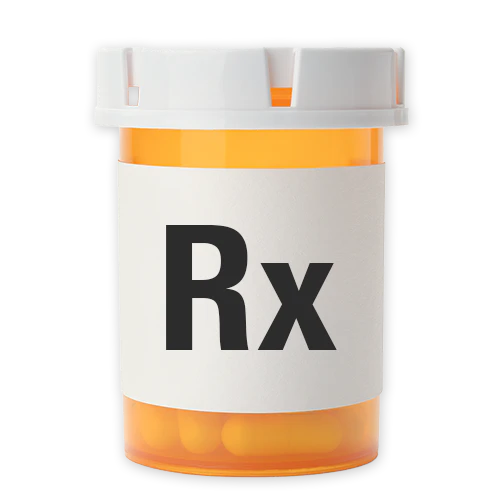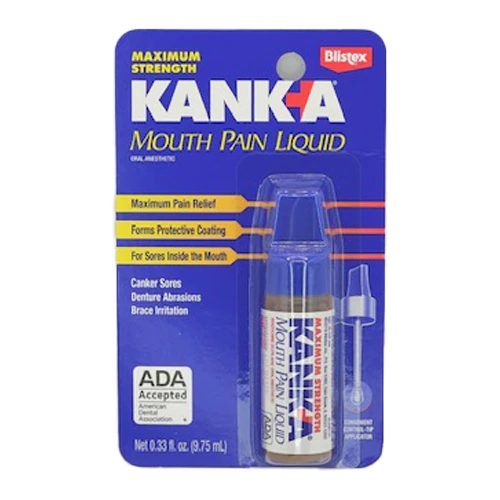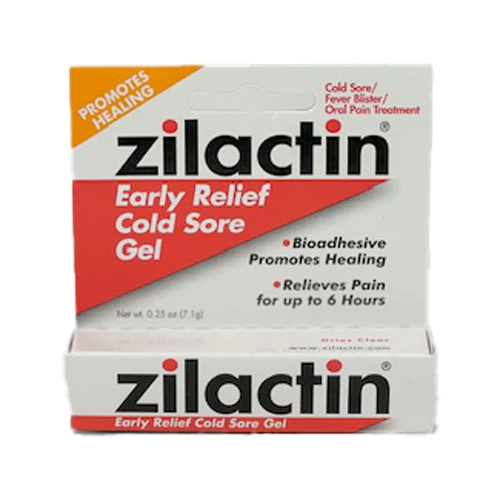- Cold sores are small, uncomfortable, fluid-filled blisters that typically form on/around the mouth.
- Tingling and itching near the lips are common signs of an oncoming cold sore.
- Cold sores can be triggered under many circumstances, including stress, lack of sleep, illness, and injury.
- There are both over the counter and prescription medication options to help reduce the severity and duration of cold sore outbreaks.
Overview
A cold sore, also known as oral herpes, is a highly contagious viral infection caused by the herpes simplex virus (HSV), primarily HSV-1. It typically manifests as a painful blister on or around the mouth. Once contracted, the virus remains in the body for life, although not everyone experiences recurring outbreaks.
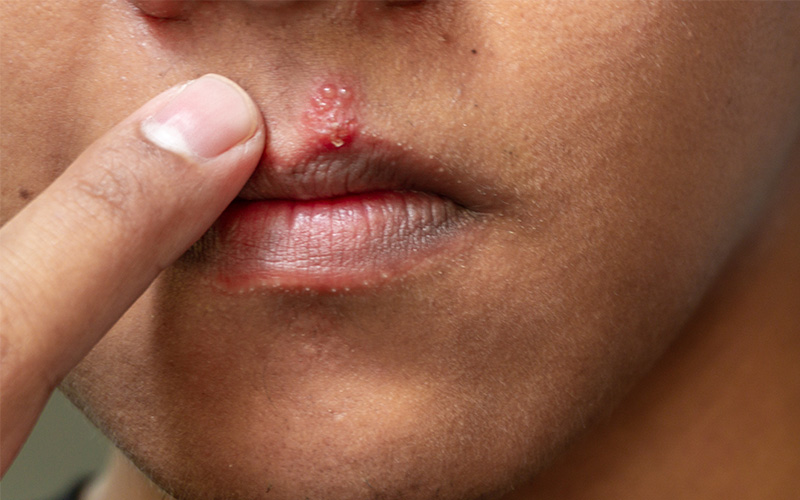
These blisters usually last 5-10 days and can be spread through close contact, such as kissing, oral sex, or sharing personal items like lip balm or utensils. While there's no cure, various treatments can help manage outbreaks and reduce their severity. Additionally, identifying and avoiding personal triggers can help decrease the frequency of recurrences.
Prevalence
Cold sores are extremely common! In fact, over half the world’s population has likely been exposed to the herpes simplex virus (HSV) at some point. According to the National Institutes of Health, up to 90% of adults have encountered HSV by age 50. However, not everyone who comes into contact with the virus develops cold sores. While the virus remains in the body for life for those exposed, only 20-40% experience the characteristic blisters.
HSV typically lies dormant but can reactivate under certain conditions. People with cold sores often have 3-4 outbreaks per year, although this number can vary significantly from person to person.
Symptoms
Cold sores develop in stages. Early symptoms usually appear on or around the lips and include:
- Tingling
- Burning
- Itching
Over the next few days, the blister bursts, releasing a clear or slightly yellow fluid. It then forms a crust and heals within 5-10 days. Initial cold sores tend to be more severe, while subsequent outbreaks are often less frequent and less intense.
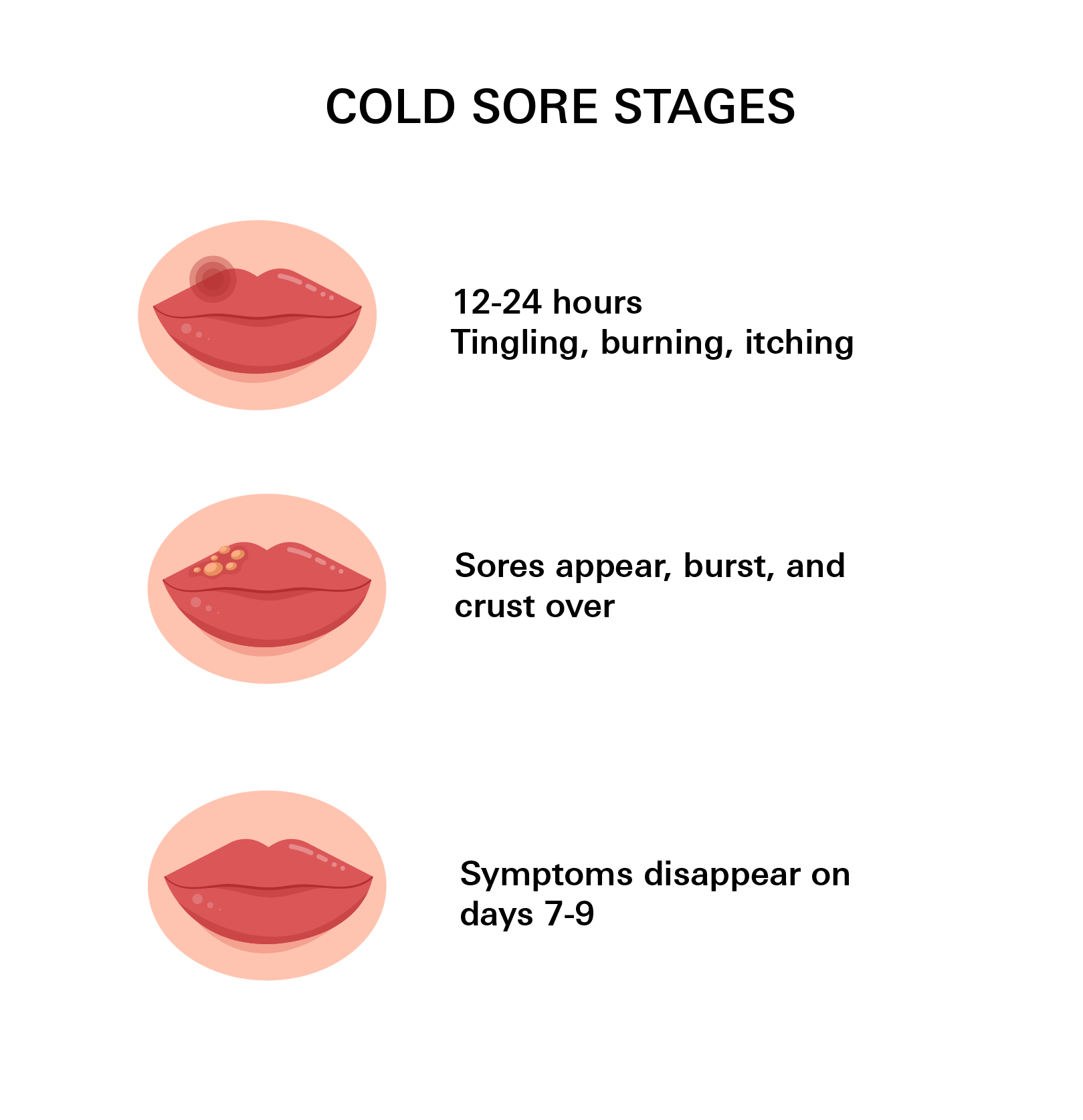
Triggers
While HSV causes cold sores, certain factors can trigger the virus to reactivate. When this happens, the virus travels from its dormant state in the spine to the lips, causing a cold sore. Often, these triggers are unknown. However, common factors include:
- Stress (emotional or physical)
- Illness (a cold or flu)
- Extreme tiredness/lack of sleep
- Exposure to the sun/sunburn
- Hormonal changes (pregnancy, menstrual periods)
- Injuries, including dental work or surgery
Each person typically has individual factors that are more likely to trigger their infection. What triggers a cold sore in one person may not do so in another. Getting to know your own individual triggers may help you avoid activating the infection and reduce the number of cold sores you experience.
Treatment
Cold sores typically heal on their own within 5-10 days. However, various treatments can help reduce the severity and duration of the infection, as well as minimize the risk of spreading it to others.
Basic care involves keeping the area clean with mild soap and warm water. Additionally, several medications can help relieve discomfort or treat the infection.
Over-the-Counter (OTC) Medications
There are various non-prescription options for managing cold sores, which fall into three main categories: topical treatments, local numbing agents, and oral pain relievers.
- Topical Treatment: Docosanol (Abreva) is the only over-the-counter topical treatment for cold sores. Applied five times daily from the earliest signs of an outbreak, it helps prevent the virus from spreading in skin cells, potentially shortening the infection duration.
- Local Numbing Agents: Products containing local anesthetics like benzocaine, lidocaine, or tetracaine can temporarily numb the area, providing relief from pain and discomfort. Available in pastes, gels, liquids, and sprays, common options include Anbesol Gel, Kank-A Mouth Liquid, and Orajel Mouth Sore Gel. Zilactin-L, containing benzoyl alcohol, is another option for pain relief, though its effectiveness and mechanism are less understood.
- Oral Painkillers: Over-the-counter pain relievers like acetaminophen (Tylenol), ibuprofen (Advil), and naproxen (Aleve) can reduce cold sore pain. Ibuprofen and naproxen are often preferred due to their anti-inflammatory properties, which can help with swelling and redness. Aspirin should be avoided in individuals under 19 due to the risk of Reye's syndrome.
Prescription Medications
If you experience frequent cold sores, your healthcare provider may recommend prescription antiviral medications. These come in both topical and oral forms.
- Oral Antivirals: The most effective products used to treat cold sores are oral antiviral medications. These medications must be taken as soon as the first signs of a cold sore appear and continued for 1-7 days, depending on the specific product. These products are thought to slightly decrease the duration and severity of the infection by preventing the virus from replicating in the skin. This is why oral antivirals must be started early, as they need to work before too much of the virus has already spread. These medications are considered very effective and are typically well tolerated by most people. There are three main antiviral medications prescribed for cold sores:
- Valtrex (valacyclovir)
- Zovirax (acyclovir)
- Famvir (famciclovir)*
- Topical Antivirals: Applied multiple times daily, topical antiviral creams or ointments can help slow the virus's spread and reduce the severity of cold sores. While less effective than oral options, they may be suitable for those who cannot or prefer not to take oral medication. FDA-approved options include:
- Denavir cream (penciclovir 1%)
- Zovirax cream (acyclovir 5%)
- Zovirax ointment (acyclovir 5%)**
- Xerese cream (acyclovir 5%/hydrocortisone 1%)*
Xerese differs from the others as it is a combination of both antiviral and anti-inflammatory creams. This combination treats the cold sore with the antiviral component and reduces pain and inflammation of the lesion with the anti-inflammatory addition. It is thought that this combination may be more effective at treating cold sores than the individual products.
*Only indicated for the treatment of recurrent cold sores
**Only indicated for immunocompromised adults
Prevention
Cold sores are highly contagious. However, you can minimize the risk of spreading the infection by taking precautions. This includes:
- Avoiding kissing or oral sex with someone who has an active cold sore.
- Not sharing utensils, dishes, lip products, water bottles, cigarettes, or straws with someone who has a cold sore.
- Washing bedding, clothes, and towels in hot water after contact with someone who has a cold sore.
- Washing hands regularly and avoiding touching your mouth.
It's crucial to prevent cold sore transmission to vulnerable populations, such as people with weakened immune systems and young babies. These individuals are at higher risk for complications from the virus. Extra care should be taken to avoid contact with people or objects exposed to the herpes virus. This includes frequent handwashing, avoiding kissing babies, and regularly cleaning toys.
When to See a Healthcare Provider
There are instances when you should seek medical attention for a cold sore. These include:
- A weakened immune system.
- A cold sore that won't heal.
- A cold sore appearing in a location other than the mouth, such as the genitals.
- A cold sore with unusual symptoms, like pus, increased redness, or spreading.
Even with a typical cold sore, consulting a healthcare provider is beneficial, especially if you experience frequent outbreaks. They can confirm the diagnosis, identify potential triggers, and recommend appropriate treatment options.
Related Topics
Cold Sores: Causes, Prevention, and Treatment
Cold sores, also commonly referred to as herpes labialis, are small, painful, fluid-filled blisters or sores. These typically appear on or around the lips. They can also occur on the face or inside the mouth.
Read moreValacyclovir for Cold Sores
Valacyclovir, commonly known by its brand name Valtrex, is an antiviral medication that helps manage infections caused by specific types of viruses. It is used to treat several viral infections, with treatment guidelines varying between adults and children
Read moreFight Cold Sores with Acyclovir
Valacyclovir, commonly known by its brand name Valtrex, is an antiviral medication that helps manage infections caused by specific types of viruses. It is used to treat several viral infections, with treatment guidelines varying between adults and children
Read more